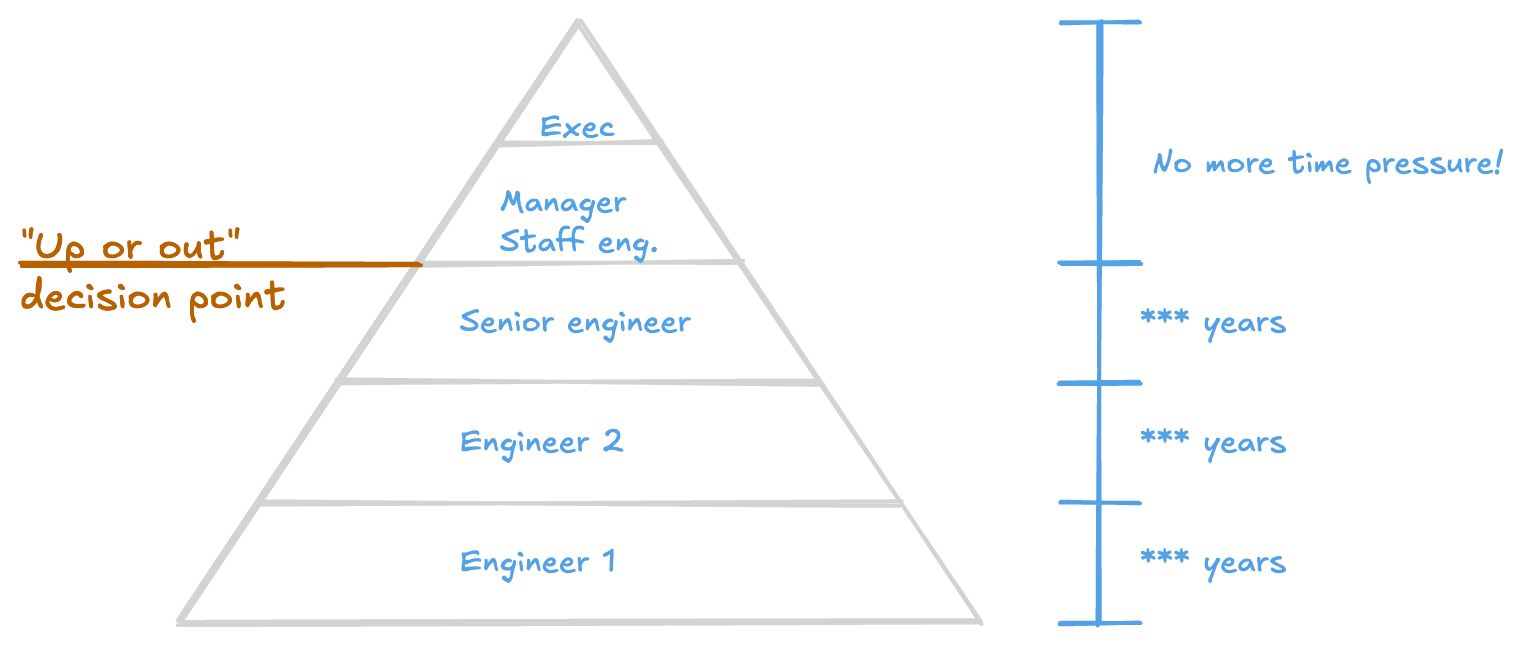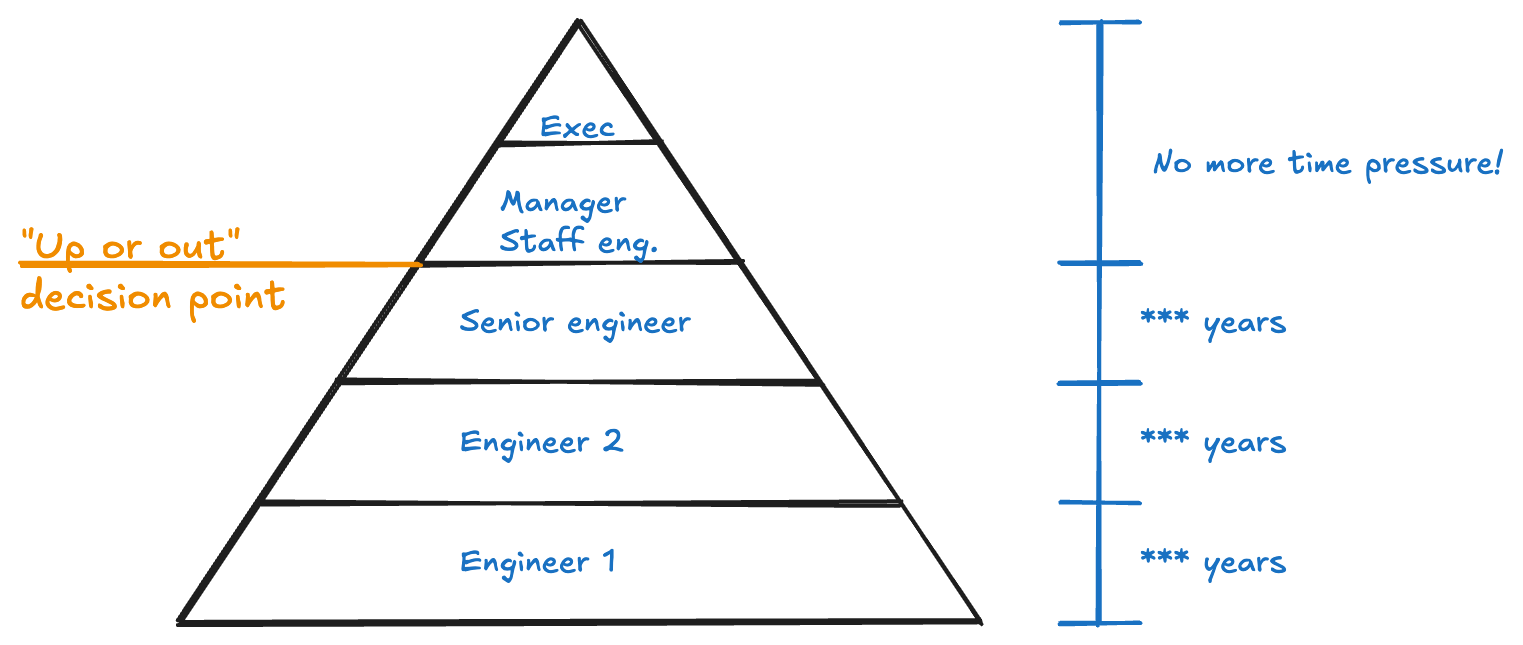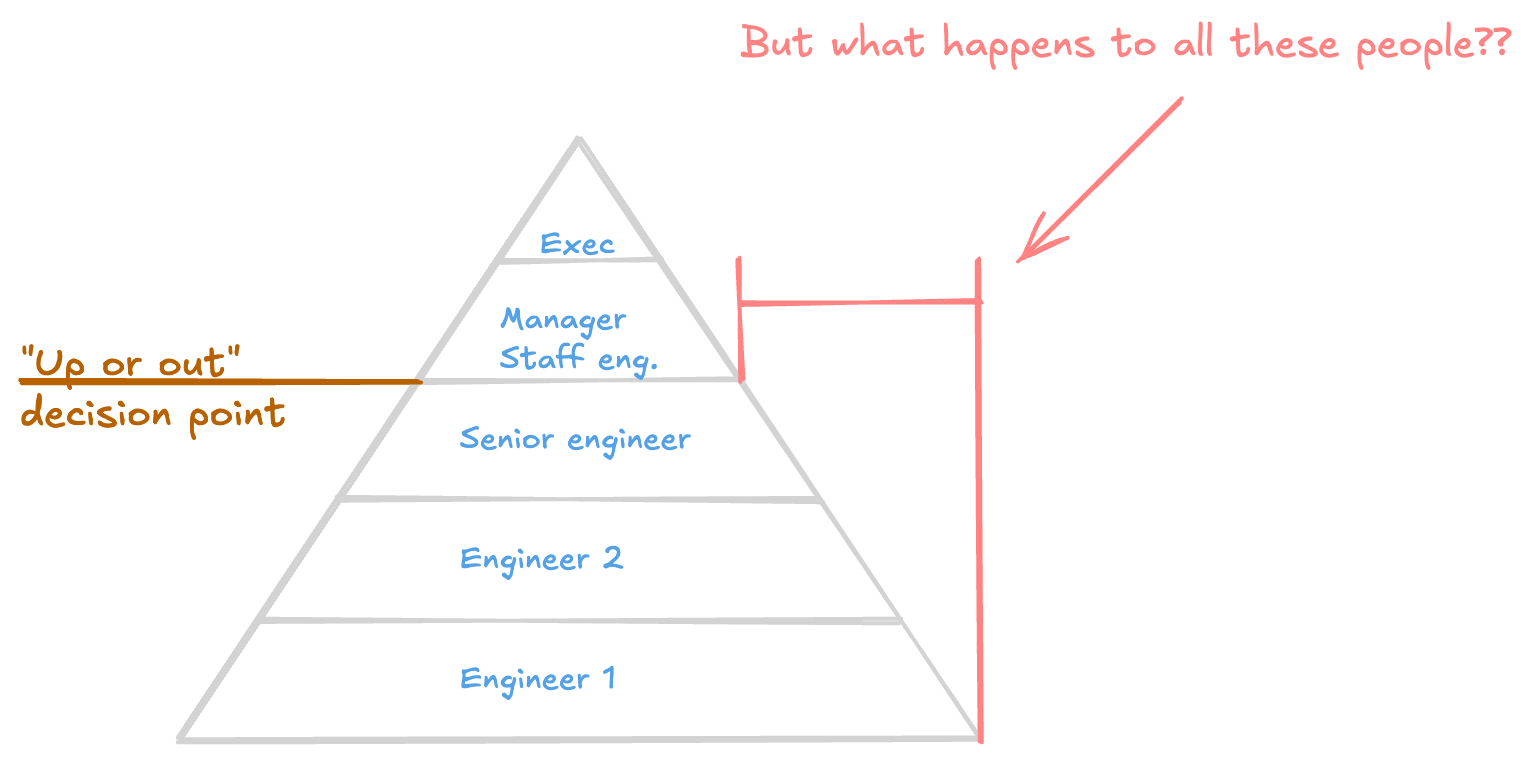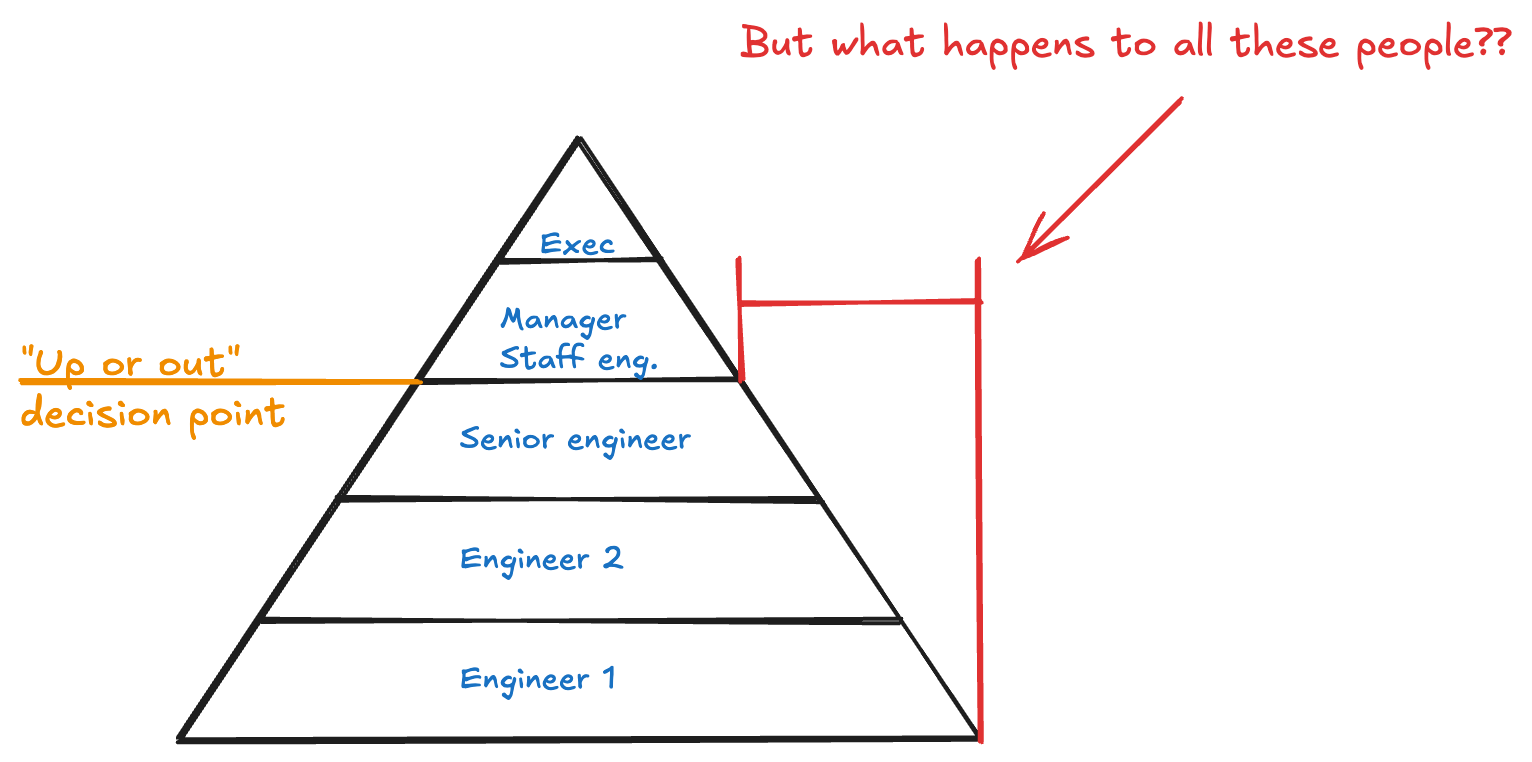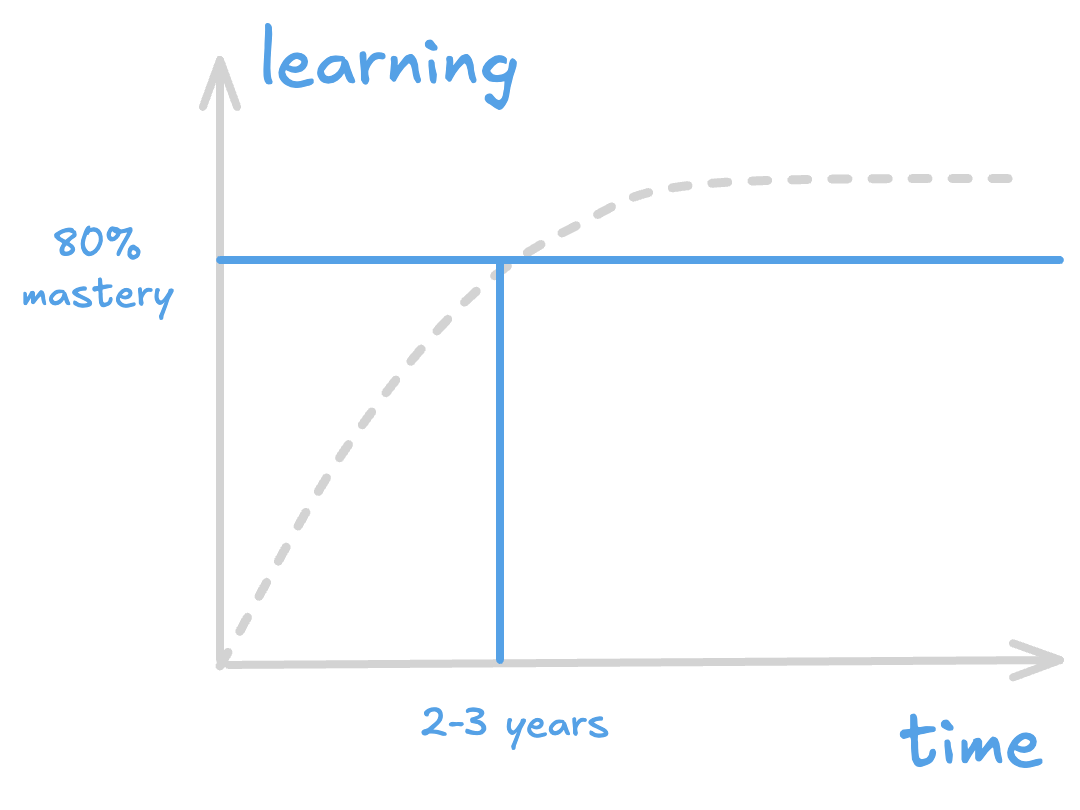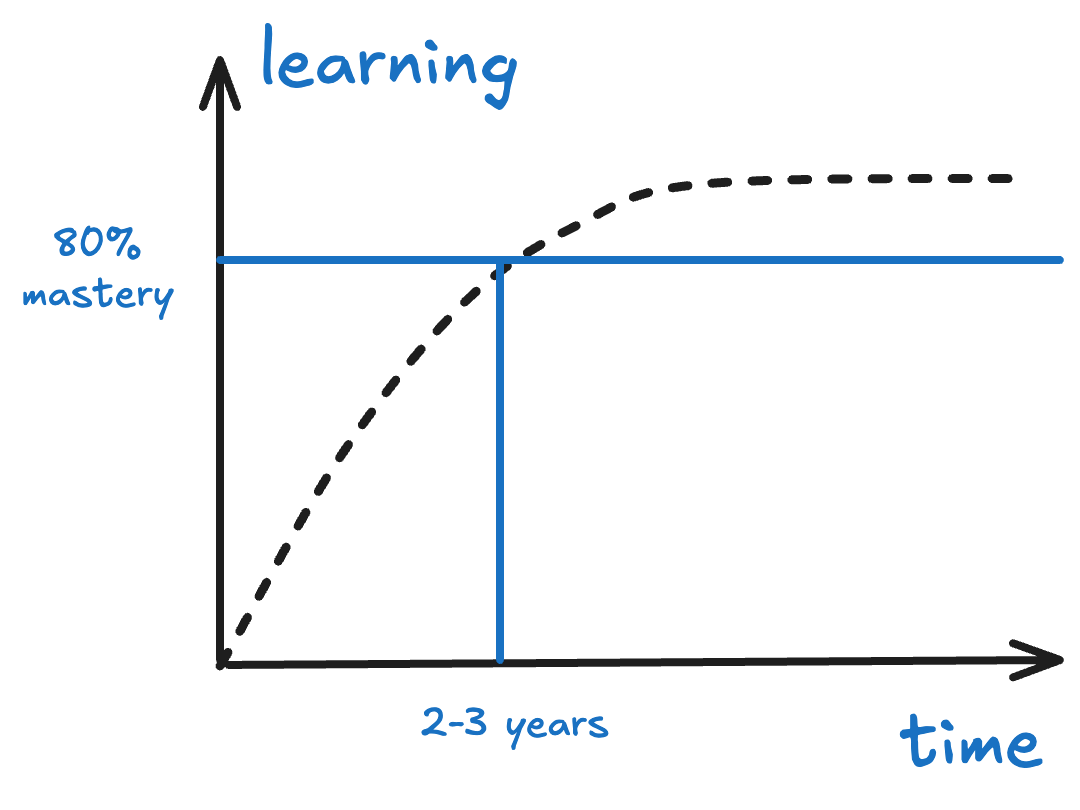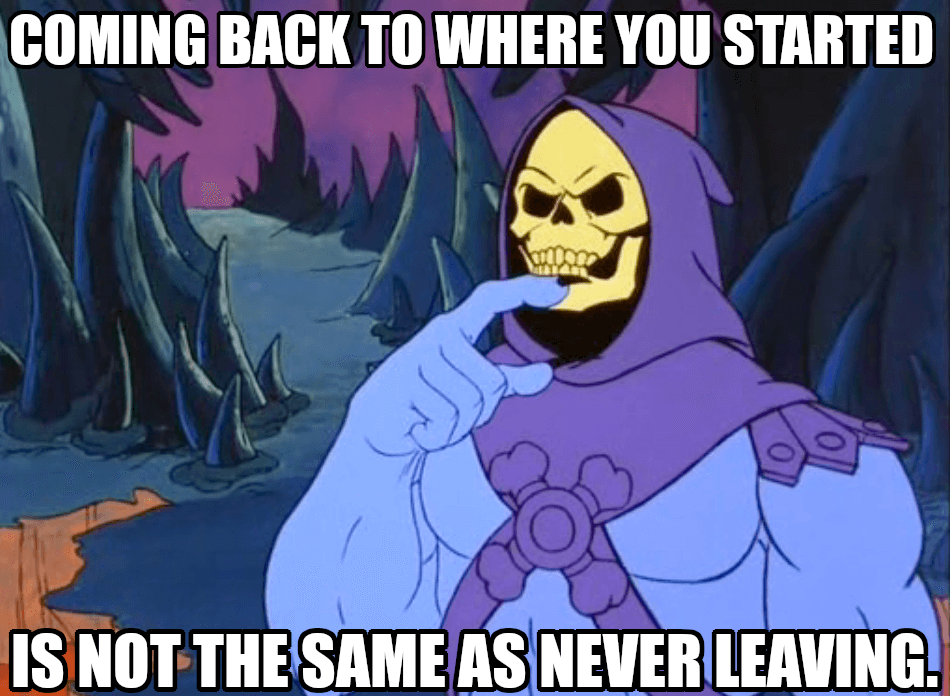Are you done learning?
About a week before I submitted my resignation from my last role, a spirited conversation happened in a Slack channel dedicated to employee compensation - specifically the well-known trend of new hires being better compensated than existing employees for the same role and job-hopping to maximize compensation. This seems baffling at first. Why lose good people for less than it’d cost to replace them?
Having been a part of another industry and hiring chats before moving into tech, I have some context. While I don’t have magical insight into your situation or your company, this can work to your advantage too - presuming you know what you want.
Up or out
A big portion of my career so far was spent in an industry with a particular culture management philosophy1. You join Big Consultancy, but there’s an expectation of about the uh … shape … of your tenure there.
There is a point (or several) where you’re expected to compete for a limited number of slots at the next level. If you don’t make it within a set time frame, you’re expected to leave.
If you’ve ever worked at a place where folks “just need to make Partner” or “get promoted to rank” or move into a tenured position, then you’ve seen (parts of) this system. Leaving with a good brand name on your résumé, customers who would be likely to hire you, a good network of other people in the industry, etc. is a value that’s hard to put a price on. In consulting, this is called “exit opportunity” and it’s part of what you consider in a job offer.
Okay, maybe “out” was too strong
We’re way more flexible in tech as opposed to management consulting. Without the pressure to move out after a set number of years or promotion failures, the path and pace you take is up to you. You can stay in the same role or move laterally without repercussions (in theory, anyways).
Taking the upwards pressure out doesn’t make more opportunities “upwards” available, though. There’s genuinely nothing wrong in not having that “up or out” pressure - buuuuuut that’s why every random HR conversation starts with “there must be a business need for <role> at <level>”. A company doesn’t need a bunch of staff+ engineers or client principals compared to folks doing the work regardless of their tenure. This is unmistakably clear for consultants and others familiar with this track, but seems to be a revelation to many of my colleagues in engineering.
It’s more than acceptable to hang out where you’re comfortable, especially when there are other priorities in your life. Guiltlessly take advantage of this when you want to! 🌸
What do you want?
My bias is that I want to learn new things at work. Work takes up a lot of my time and I love to learn.
If you want to max out the variety of challenges to tackle, moving on (upwards or otherwise) isn’t a bad thing. I’ve found my “marginal learning curve” is mostly logarithmic. There’s a great rush of adventure early on, then after some time the daily lessons taper off and I have to actively find ways to learn more. That point is about two years for me, give or take a year.
There’s valuable learning to be had on both sides of that point. Try to do both at different points in your career if you can. On one, there’s an abundance of new lessons to learn every day. On the other, there’s an opportunity to develop deep expertise and work on larger scale projects than possible to fit within a year or three. Both are professionally fulfilling. 🌱
Try not to get too complacent for too long. It’s hard to get back into shape. Try to be deliberate on how long to stay focused on one technology or project if possible. To figure out if it’s time to move on, ask
Am I done learning here?
When boredom sets in, figure out ways to stay engaged - up to and including finding a new job or role. Pitch a new project, take a class, get a certification, scratch the itch to build something - but do something. Always keep the résumé up to date anyways because new opportunities tend to be serendipitous. 😇
One of the best things about bigger consultancies is splitting out a “career manager” from a “job manager” as two separate roles. Job managers handle day-to-day management tasks - is the work getting completed correctly, checking time sheets, performance reviews, etc. A career manager isn’t in your leadership chain. This lets them offer advice independently of the contract/account you’re on, be a safe place to vent, and create connections throughout the larger company. Keeping you at the company, but on another task, is valuable.
“Big tech” doesn’t seem to do this at all, so consider the conflict of interest one manager has. Your manager doesn’t want to have to replace a valuable teammate. Hiring sucks every bit as much as interviewing sucks.
Only you know when it’s time to move on.
A river, not a lake
One of the best HR folks I worked with told me that “companies see their talent as a river, not a lake.”
A river moves constantly. Teammates join and leave, teams grow or shrink, reorganizations happen, the business changes, the market changes, and so much more. Some companies are fast and turbulent, while others are large and calmly move forward.
A lake is filled, but the water stays put a while. Without movement, nutrient or oxygen imbalances can happen. It’s difficult to maintain a healthy and growing environment when the business/market/product is similarly stagnant.
Comeback kids
Another unique culture of consulting is how “boomerang” hires work. Given the right opportunity at the right time, most folks who left on good terms are welcome back. Recruiting alumni is a formal part of talent acquisition at one of my former employers. It’s completely normal to be a “comeback kid”. 💖
The cynical opinion on this is “can’t make <rank>? quit and come back in two years”. This is a common path around that first difficult promotion. It also comes with a market-rate salary, likely well beyond what you’d have made if you stayed. This also feeds the trend of getting an offer letter somewhere else to get a compensation adjustment without having to actually switch jobs.
An optimistic perspective is that some amount of employee churn is good. New folks bring new ideas from their different backgrounds. Some number of boomerang hires can bring a doubly-valuable perspective. They left with an understanding of the company’s way of doing things, then return with an understanding of how to improve it with knowledge that can’t be gained without leaving.
You can never go back
No matter what, the “place you left” is gone - other people joined and left, a re-org or ten happened, some departments grew and others shrank. Comeback kids (at least all the ones I’ve worked with) don’t come back to the same place. Change happens everywhere, even when you’re not there to see it.
This job, the last one, the next one … the things you learn change you (professionally, maybe personally). Pulling from my own experience
- Owning an ATO across a large defense consultancy made me extremely attentive to details and ready to go incredibly deep technically on the things I was responsible for.
- Moving into sales gave me a better understanding of the business of building software.
- Joining a hyper-growth VC-funded startup is a rocket ride that forces extremely judicious use of my time and focus. The company is fundamentally different every couple of months, so quite a lot of my job is too.
Learning is change and time only goes in one direction.
This isn’t a loss
We humans do a lot of mental gymnastics trying to justify our sunk costs. That shiny new project, raise/promotion, new initiative, <whatever> is always just around the corner and if we just hold out a little longer it’ll all be worth it.
Maybe. Maybe not. 🤷🏻♀️
A new job has guaranteed new things to learn. What those are, how much you’ll like it there, how long you’ll be there before you’re at the same “growth ceiling” … who knows what’s next? Are you done learning?
If so, it’s not much commitment to look around and see if it’s time to move on. Adventure waits for no one.
To L, for being the inspiration to write this while in the middle of Lady Bird Lake in Austin, Texas. 🦇🦇🦇
Footnotes
-
This is usually called “the Cravath system” as explained by Cravath, Swaine & Moore LLP or more in-depth by Wikipedia . The basic principles are found all over accounting, law, and consulting. In short, you move up or get out . ↩

